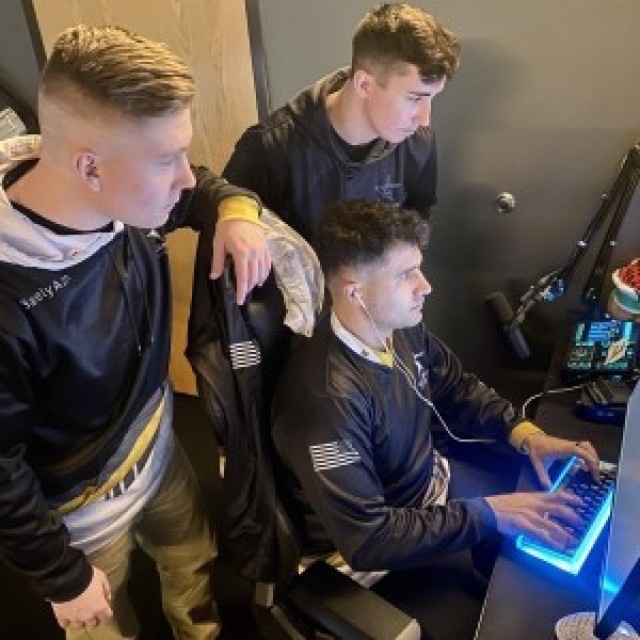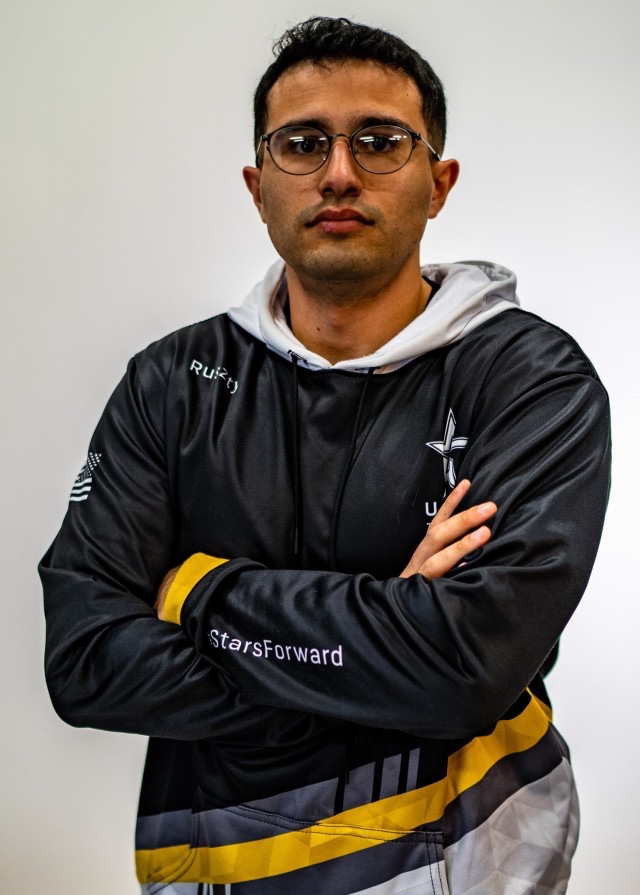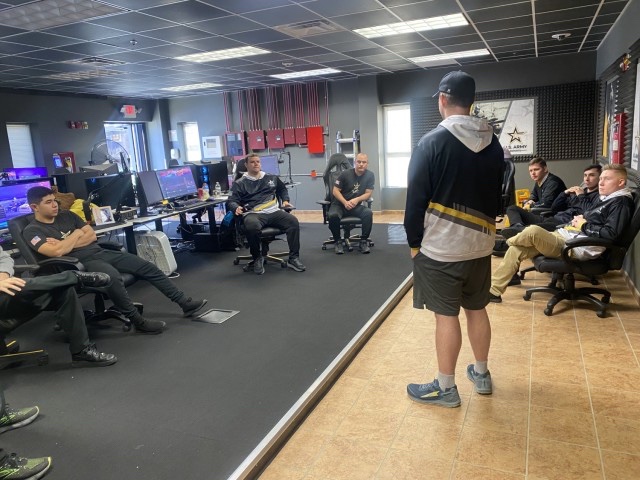
WASHINGTON — A small tactical unit is deployed into a hostile environment. Their objective: dig in and defend until the end.
Each member of the unit has their specialty; the unit leader calls all the shots, his word is what goes, and he is the one whom decides where the last stand lies. The unit weapons sergeant defends the final location and protects the backs of the other members of the unit. The last member is the unit’s explosives expert. His main purpose is to cause as much damage as possible to the enemy forces.
Each member knows their primary objective and has been studying every aspect of it for several months with their team, investing hundreds of hours working through strategies and learning everything they can about their enemies.
Yet, this is not a special operations unit. This is the U.S. Army Esports Apex Legends Team stationed out of Ft. Knox, Kentucky, and Sgt. Sebastian “Ruszty” Ochoa, a 13F fire support specialist, is one of the professional gamers on the team.
“Initially, I thought it was an email for a bunch of guys playing games, but it’s very much not that!” Ochoa said. “It is a team and a community of competitive and, honestly, elite level esports athletes that are betting everything, every time they play, and that is the biggest misconception I had.”
Ochoa is a native of Gathersburg, Maryland and enlisted into the Army out of Boca Raton, Florida where he was playing baseball for Florida Atlantic University.
“I joined the Army for a sense of structure and to get a little bit more disciplined with myself, and the Army definitely provided me with that,” Ochoa said.

A few years ago, a mass email went out to the force looking for anyone who was interested in joining the Army’s new esports, or electronic sports, team. They were looking for esports athletes who wanted to compete at high levels, Ochoa said.
“I was incredibly excited because it coincided with the perfect time for me,” Ochoa said. “In more recent years, I just started rekindling that fire [for video games] and [the email] actually ignited a little bit of a competitive drive in me.”
His friend expressed that he had the potential skill to compete. So, he talked with his wife. They agreed he should reach out through email and join the Army Esports Team community Discord server, Ochoa said.
For the next six months, he started training in his game of choice, Apex Legends.
Apex Legends, or Apex for short, is a multiplayer, battle royale-style shooter game in which 20 three-person teams collect weapons and battle it out to the last team standing.
“I probably put in about 2000 hours,” Ochoa said. “I went to physical training like normal and worked my normal hours.”
After work, he would have dinner and spend time with his wife. She would head to bed, then he would get started on his nightly training. Typically, he would put in six to seven hours honing his skills and finding teammates. Then wake up and do it all over again.
Then in November of 2021, he submitted his application. He was selected, along with 45 other Soldier for tryouts.
“It was a month-long process of group tryouts,” Ochoa said. “And I was one of four people chosen out of that 45.”
The U.S. Army Esports Team focuses on five games; Apex, Rocket League, Overwatch, Call of Duty and Halo. Normally, there are over a hundred people on the Army’s esports team. These folks are called the at-large team. The at-large pro-gamers train and compete at their home station, on their own time. They also compete on a regular basis to see who will get on the competing teams. Only two of these titles have resident gamers, Apex and Rocket League.
“I know it may sound like a small number [of titles],” said Victoria McAdoo, the public affairs specialist for the Army esports teams. “But just because of the level of the competition and the time that goes into training for each of the competitions and each of the titles, they focus on quality and not quantity of the titles.”
Esports is highly competitive, and there is such a diverse group of players and titles. We want to be in the top ranks with the rest of the elite, professional esports athletes. Therefore, our in-house esports teams specialize on two titles, McAdoo said.
The few that have demonstrated the proper skill levels to delve into the world’s elite gamers could receive PCS, or permanent change of station orders.
In February 2022, he was selected for the in-house Apex team along with five other Soldiers and received PCS orders.
“First and foremost, I am a Soldier. So, I still must stay within Army regulations and standards,” Ochoa said. “Coming from Fort Bragg, I go for a run every morning and do some other sort of workout.”
Every morning the team comes together for a strategy meeting. These strategy meetings can last anywhere from one to four hours depending on what the team is going over.
We will usually talk about what we did the day prior, strategize on how we are going to play and which characters we are going to use. We will scrub through our game recordings to identify deficiencies and weaknesses. Then we figure out how to improve or better handle these areas, Ochoa said.
After their strategy meeting, if there is military training that needs done, that becomes the priority. If all military requirements are done, one of three things happen: they work with an at-large coach, conduct aim training or open the game and start working through scrimmages.
“Aim training is a program on the computer where you try to hit different target at different angles,” Ochoa said. “It helps honing your reflexes, honing your ability to hit targets at an ever-changing pace and in different areas.”

Some of the other aspects they must train on with the game is knowing the inherent abilities of each of the characters, studying the abilities of each of the weapons and understanding how each of the team members prefer to play.
“We have to learn, and we have to know, and it all comes from hours and hours and hours of playing with my specific teammates,” Ochoa said. “Without teamwork, we are not able to be competitive enough to compete with some of these guys that play for a living.
In Apex, there are two seasons per year. These start in October and April with the world finals in July. The U.S. Army Esports Apex Legends Team competes in the North American region. The five regions are based off the continents: North America, South America, Europe, Asia and Australia.
“[During a competition] it feels very, very overwhelming,” Ochoa said. “You get to play against some of the biggest names in the world in this video game. I think it’s currently the third most watched game on Twitch. It’s been an immensely popular game … the competitions we are playing are at an elite world level against these guys.”
So, one may think, what happens if the team wins a competition?
“These are professional athletes, so although they have the pride of wearing the U.S. Army star on their chest when they go out and compete, if they win, they get to keep what they win,” McAdoo said. “We have a Warrior Fitness Team and an Outdoors Team, in addition to the U.S. Army Esports Team and a rock band. One of our members of the Warrior Fitness Team, she was the strongest woman in the world, which comes with prize money, and she got to keep it because that’s what she trained for.”
The team is still part of the U.S. Army Recruiting Command, and Ochoa believes that the U.S. Army Esports Team helps promote recruiting in a different way.
Honestly, [the team] brings awareness to the fact that although we are Soldiers from a civilian aspect, it changes the views and perspective they have on us,” Ochoa said. “Not every Soldier is in infantry, not every Soldier sleeps with a rifle all the time. We are elite esports athletes. We can do things that we love at a very elite level.”
The Army won’t stop them from doing the things they love, it will support them,” Ochoa said. “The Army esports team is a good way to get a different perspective out there on way the Army can provide … and we are able to connect with so many people from it.”
The esports team could connect with a diverse group of people, some who may never have considered the Army because their goal is to become an esports athlete, and it helps to show that the Army will help to support people’s goals, Ochoa said.
The Army will train you up with skills and experience, while you serve your country and give you everything you need to compete. Then when you are ready to leave, you will be able to take all those skills, training and everything else with you for your life in the esports competitive world, McAdoo said.
“The Army has 150 jobs, and I’m living proof that you can serve your country and get paid to do the things you love to do,” Ochoa said. “We really want to start having people see the Army as an option and kind of a steppingstone to be able to reach any goal you want.”
By SSG Jacob Kohrs, Army News Service


Reason #157 we shouldn’t talk about going to war with any other Country.
Now we just need badges, medals, and awards for our esport soldiers
I’m picturing a super long tab similar to ‘Presidents Hundred’
‘VIRTUAL SPECIAL FORCE’
Sigh. I’m torn on this- there’s certainly a difference in capability between these kids and outdoorsy ones , but it’s not as one-sided as you would think. I get sim sickness pretty quickly and can’t approach the familiarity these guys have with multiple current systems that mimic game controls and it could be a heck of a recruiting tool. It still causes a twinge of pain when I see communities building sports centers that have a bigger gaming room than they do pools.
I rarely comment on articles here but this time I had to say something: this article is the most poorly written and confusing mess I’ve ever read on SSD. Apparently the Army no longer proofreads or edits press releases before sending them out. I guess when you’re too busy with diversity, equity and inclusiveness activities there is no time left for the editorial process. I’m not even going to mention those “awesome” uniforms that make those soldiers look like…not soldiers. If this is an example of our modern army we are well and truly screwed when WWIII starts. This article/press release is not up to the usual high quality articles normally found on SSD. Now get the hell off of my lawn! Rant over.
Really sucks that legitimate wartime competencies are taking a backseat for these guys to play video games on the Army’s dime.
Yes, I know it’s not the whole Army…but with more and more young people unironically thinking that social media star/influencer/pro gamer are legitimate career choices, the kinds of applicants this stuff attracts isn’t going to be a good return on investment for the Army.
You’re dead wrong there. These gamer kids are the ones who grew up or are growing up playing the FPS’s, large scale survival ,and strategy games. They make that transition into real world one Kentucky Ballistics, GarandThumb, and TRexArms video at a time- next thing you know they’re carrying a rangefinder , kestrel,SDR, and drone around the woods and cities…..
I think you’re being slightly generous in your estimation of the Venn diagram overlaps between “hardcore gamer” and “gun videos sparking applicable real life interest”. Especially considering the typical physical condition of the first group (and the prime military enlistment age emographic in general) 🙁
Heh, an upgrade over that CIA ad series that basically was trying to attract the type of person that would betray America the second the administration changed.